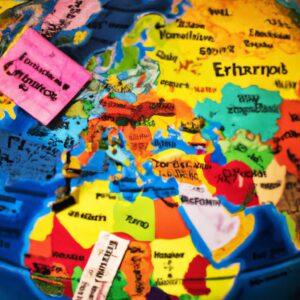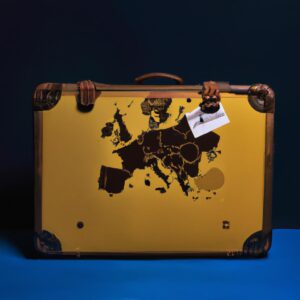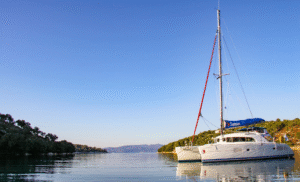
Welcome to our guide to Language Tips for Travelers: Essential Phrases in European Languages. Knowing some of the local language when travelling can mean the difference between having a great experience or getting lost in translation. Through this guide, you will learn about essential phrases in Spanish, French and German – three of the most popular languages spoken in Europe. We’ll walk you through the basics and provide you with helpful bonus tips so that you can feel more confident in communicating while abroad.
Before we dive into the essential phrases, let’s review some of the benefits of language learning. Being able to communicate in the native languages used in the country you’re visiting not only makes your trip more enjoyable, but it also serves to connect you to the local culture. Additionally, it can help you better navigate your way around different parts of the country. By the end of this guide, you should have a better understanding of some key phrases in three popular European Languages. Let’s get started!
Learning Spanish, the official language of twenty countries in the world, is essential for travelers. Being able to communicate with locals when in another country is invaluable. Here are some must-know phrases in Spanish that can make travel easier and more enjoyable!
Greetings
It’s always polite to greet people when meeting them, or saying goodbye. In Spanish, the most common greetings are “Hola” (hello) and “adiós” (goodbye). When meeting someone for the first time, you can add “Mucho gusto” (Pleased to meet you) after the greeting.
When speaking to an elder, such as an elderly person or someone in authority, you should use the phrase “buenos días/tardes/noches” (Good day/evening/night).
Introductions
When introducing yourself in Spanish, you should say “Me llamo…” followed by your name. You can also introduce other people, as long as you get their permission first. To do this, say something like “Él/Ella se llama…” followed by their name.
Pronouncing Names
Spanish is a Romance language, which means there are multiple ways to pronounce names. To find out how to properly pronounce someone’s name, it’s best to ask them directly. Some people may prefer that you call them by their nickname rather than their full name.
Questions and Statements
When asking a question, you should always say “¿Cómo?” (What?). To answer a question, you can either say “Sí” (Yes) or “No” (No). To make a statement, you should say “Es verdad” (It’s true).
Specialized Phrases
If you are looking for directions, you should say “¿Dónde está…?” followed by the name of the place. To ask the time, say “¿Qué hora es?” To ask someone their name, say “¿Cómo te llamas?” If you need help, say “Necesito ayuda.”
Polite Responses
When responding to someone, it’s important to be polite. To say “thank you” in Spanish, say “Gracias.” To say “you’re welcome,” say “De nada.” Finally, to express appreciation, say “Muchas gracias.”
By learning these simple Spanish phrases, travelers will have a basic understanding of the language and be able to communicate with locals more effectively. With a little practice, you’ll soon be able to confidently navigate Spanish conversations.
Essential Phrases in French
Heading off to France and need to brush up your skills? Don’t worry, you don’t need to be fluent in French to get by – these essential phrases will help you make your experience more enjoyable.
When shopping, it’s always useful to know a couple of basic words. Try “combien cela coûte?” To ask how much something costs, and “je veux ceci” to say “I want this”.
If you’re communicating with the locals, it’s polite to use the phrase “Parlez-vous anglais ?” when asking if someone speaks English. Too shy to try speaking French? Then try “Je cherche quelqu’un qui parle français”, which means “I am looking for someone who speaks French”.
When dining out, you can use the phrase “Je voudrais un menu s’il vous plaît” when asking for a menu. To ask for the bill, try “L’addition s’il vous plaît”.
On top of all these phrases, if you’re staying in France for a longer period of time, consider learning a few more common expressions. It’s always great to be able to impress the locals with some knowledge about their language! Try saying “Je m’appelle [name]” when introducing yourself, as well as “Enchanté de te rencontrer” when meeting someone for the first time. Other useful phrases include “Comment allez-vous?” To ask how someone is doing, and “Au revoir” as a way of saying goodbye.
Essential Phrases in German – Important Terms for Travelers
If you plan on traveling to Germany, memorizing a few key phrases will help you get around. German is an interesting language with tons of opportunities for learning. While there are many regional dialects and variations in pronunciation, especially among native speakers, the basics of the language remain the same.
While German might seem difficult and intimidating at first glance, it is actually a very logical language with easy-to-remember grammar rules. Here are some essential phrases to help you get started:
- Hallo – ‘Hello’
- Guten Tag – ‘Good day’
- Wie heißen Sie? – ‘What is your name?’
- Gut – ‘Good’
- Danke – ‘Thank you’
- Bitte – ‘Please’ or ‘You’re welcome’
- Entschuldigung – ‘Excuse me’ or ‘I’m sorry’
Communicating with locals is a great way to learn more about the language as well as the culture. Questions like ‘Woher kommst du?’ (‘Where do you come from?’) and ‘Was machst du?’ (‘What do you do?’) are sure to spark up a conversation. If you’re ordering food or drinks at a restaurant, you may want to memorize the numbers 1-10 and words such as ‘bitte’ (‘please’) and ‘danke’ (‘thank you’).
It is always a good idea to familiarize yourself with useful phrases and greetings before starting your trip. This will add to a more enjoyable and smoother experience overall. With practice and patience, you’ll find that learning German is a rewarding and worthwhile endeavor!
Language is one of the most important tools to have when traveling in a foreign country. Knowing the native language is key to getting around, making friends, and having a great vacation. This guide will provide essential phrases for travelers in three major European languages: Spanish, French, and German. With this knowledge, travelers will be able to have a much better experience abroad.
This guide will cover words and phrases that are essential for travelers to know when venturing into Europe. After exploring these three languages, readers will also get a few bonus tips and tricks to help them learn even more.
So let’s get started!
We’ll begin by exploring essential phrases in Spanish for travelers. Whether you are in Spain or Mexico, it’s always helpful to know basic Spanish terms. To help, here are some common Spanish phrases to get you started:
- ¡Hola! – Hello!
- Vengo de… – I come from…
- ¿Cómo te llamas? – What is your name?
- ¿Qué hay de bueno? – What’s good?
- ¿Cómo puedo llegar a… – How can I get to…?
As you can see, even knowing a few phrases in Spanish can go a long way. Next, we’ll take a look at essential phrases in French. From France to Canada, French is widely spoken in many countries. To get the most out of your travels, it’s important to have an understanding of French. Here are some basics to get you started:
- Bonjour! – Hello!
- Je viens de… – I come from…
- Comment t’appelles tu? – What is your name?
- Qu’est ce qu’il y a de nouveau? – What’s new?
- Comment puis-je arriver à… – How can I get to…?
Knowing even a few French phrases can make a world of difference while traveling. Last, but not least, let’s take a look at essential phrases in German. Used throughout Germany and Austria, German is a popular language among travelers. Here are some key phrases to know:
- Hallo! – Hello!
- Ich komme aus… – I come from…
- Wie heißt du? – What is your name?
- Was gibt’s Neues? – What’s new?
- Wie komme ich nach… – How can I get to…?
These simple phrases can provide travelers with an essential foundation of their language skills in Europe. Now, it’s time to move on to our bonus tips section for more advice and suggestions.
Bonus Tips – The Keys to Mastering European Languages
Learning a new language can be daunting and intimidating, but with the right tips and tricks, you can make the process easier. Here are some bonus tips to help you out in mastering the essential phrases in European languages:
- Location Matters: It is important to learn and practice the language in the environment where it is spoken. This will help to you to understand the dialect and pronunciation of the language.
- Immerse Yourself: Being immersed in the language provides the best learning experience. Learning from books alone will not help as much as actually coming into contact with the language on a daily basis. Watching TV shows or movies and listening to music in the language are great ways to immerse yourself in the language.
- Find A Language Exchange: Language exchanges are great way to practice and perfect the language. Finding someone to practice with also allows you to ask questions and get feedback in real time.
- Learn Through Music: Music is a great way to gain an understanding of language without spending too long studying. Listening to songs in the language, and understanding the lyrics, will expand your vocabularies and help you to pronounce words correctly.
- Travel: Traveling to a country where the language is spoken is the fastest way to gain fluency. It helps to practice the language with the people who use it. Plus, you can experience the culture and traditions of the country first-hand.
By following these tips and studying the essential phrases for each language, you will be able to pick up the language quickly and effectively. It is worth the effort to learn and master a foreign language as it broadens your horizons and opens up many new opportunities.
Are you a traveler who wants to explore European countries and communicate with locals? If so, learning essential phrases in the languages of the places you will visit can help you immeasurably. In this guide, you will find language tips and key phrases for Spanish, French, and German.
We know that learning a new language can be daunting. That’s why we have put together this guide to make it easier for you. Read on to learn essential phrases in each of the European languages and gain valuable tips for language learning.
Introduction
Are you preparing to embark on a European adventure? Maybe you’re going to Spain for a beach holiday, or to France for a gastronomic tour. Or perhaps you’re headed to Germany for a snow-filled winter escapade. Whatever the case, knowing a few essential phrases in the local language can significantly enhance your experience.
This guide is designed to equip you with the language skills you need to get around in Europe. We will take a look at essential phrases in Spanish, French, and German that are commonly used by travelers, as well as bonus language tips that will help you stay open to learning new things. Let’s get started!
Essential Phrases in Spanish
Spanish is a popular language spoken by over 500 million people worldwide. Knowing a few key phrases will come in handy when you travel to Spanish-speaking countries. Here are some important terms to add to your vocabulary:
• Hello: Hola
• Good morning: Buen día
• Good evening: Buenas noches
• Please: Por favor
• Thank you: Gracias
• Yes: Sí
• No: No
• Excuse me: Disculpe
• Do you understand?: ¿Comprende?
• I don’t understand: No entiendo
Aside from basic phrases, you should also become familiar with Spanish numbers. Knowing how to count in Spanish is essential when making purchases or asking for directions. Here are the numbers from one to ten:
1 – Uno
2 – Dos
3 – Tres
4 – Cuatro
5 – Cinco
6 – Seis
7 – Siete
8 – Ocho
9 – Nueve
10 – Diez
Once you’ve got the basics down, you can move onto more complex phrases. Ready to start conversing with the locals? The following phrases will help you make conversation in Spanish:
• What is your name?: ¿Cómo te llamas?
• Nice to meet you: Mucho gusto
• Where are you from?: ¿De dónde eres?
• How are you?: ¿Cómo estás?
• I’m good: Estoy bien
• I’m hungry: Tengo hambre
Keep practicing and you will soon be confident enough to navigate conversations in Spanish. Now let’s move onto French.
comments: 0








